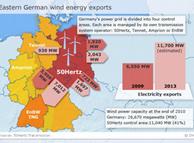I should have called this post the risks of German power, but alas…here is an interesting look at the risks from harnessing the unlimited yet variable input of wind:
In 2006, when wind farms were few and far between, coal, gas and nuclear power plants produced just the amount of energy needed in eastern Germany at the time, but also created large amounts of nuclear waste and carbon dioxide emissions. The system was relatively stable. One average, engineers took action to stabilize the eastern German grid roughly 80 times a year.
Today, as the amount of electricity generated by the region’s 8,000 wind turbines rises and falls by the hour, engineers have to intervene every second day to maintain network stability.
Germans are now pushing so much power from wind through their system that it is in danger of overload. One new and different thing about wind (like solar) is that its variable rate of input means storage is important and a sensible way to convert it to a constant output. With petroleum it is stored and then converted into output, using storage to manage flow rates, but unfortunately a method of storing wind energy has not been engineered yet.
The article points out that petroleum power plants are instead supposed to be shutdown and give priority to wind during surges. That, of course, doesn’t happen because it puts the grid at a higher risk of variability and control issues (operational cost?) so they instead try to export their overproduction, which puts the grid at a higher risk of overload.
Although large high-energy long-life batteries are still considered so toxic that only the military is allowed to use them…what eastern Germany could do is create the equivalent of barrels of wind energy for consumers. That would give them the option to store or export energy just like with petroleum. Maybe it could take the form of hundreds of thousands stored energy blocks (batteries) hot-swappable into electric transportation, especially bikes.
Imagine riding across town and then pulling in to a grid/battery station and swapping out for a fresh charge. Storage problem solved, excess power problem solved, a more viable electric transportation market (longer range, faster recharge), with exports options still open and to an even wider market.

Storing power has never before been so much fun.
Maybe it’s just me, but the Deutsche Welle graphic of German power seems a little historically insensitive:

One thought on “Risks of (Wind) Power Overproduction”